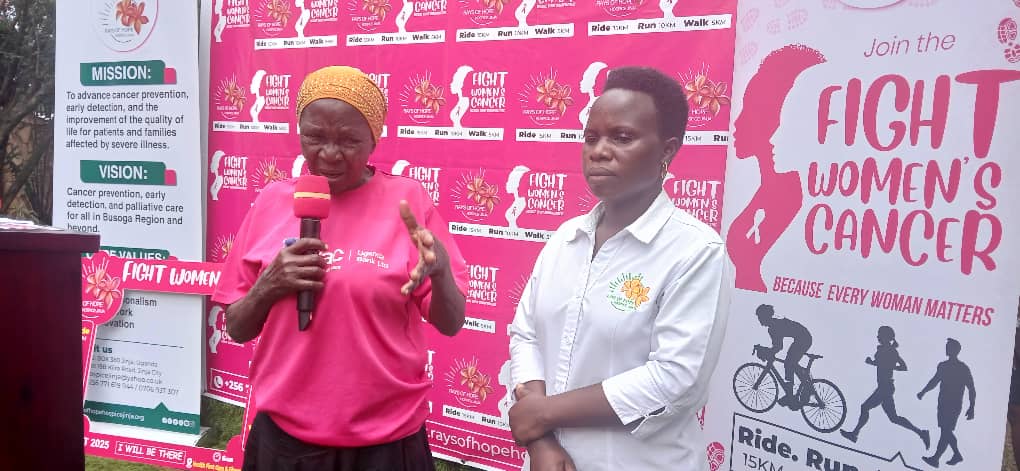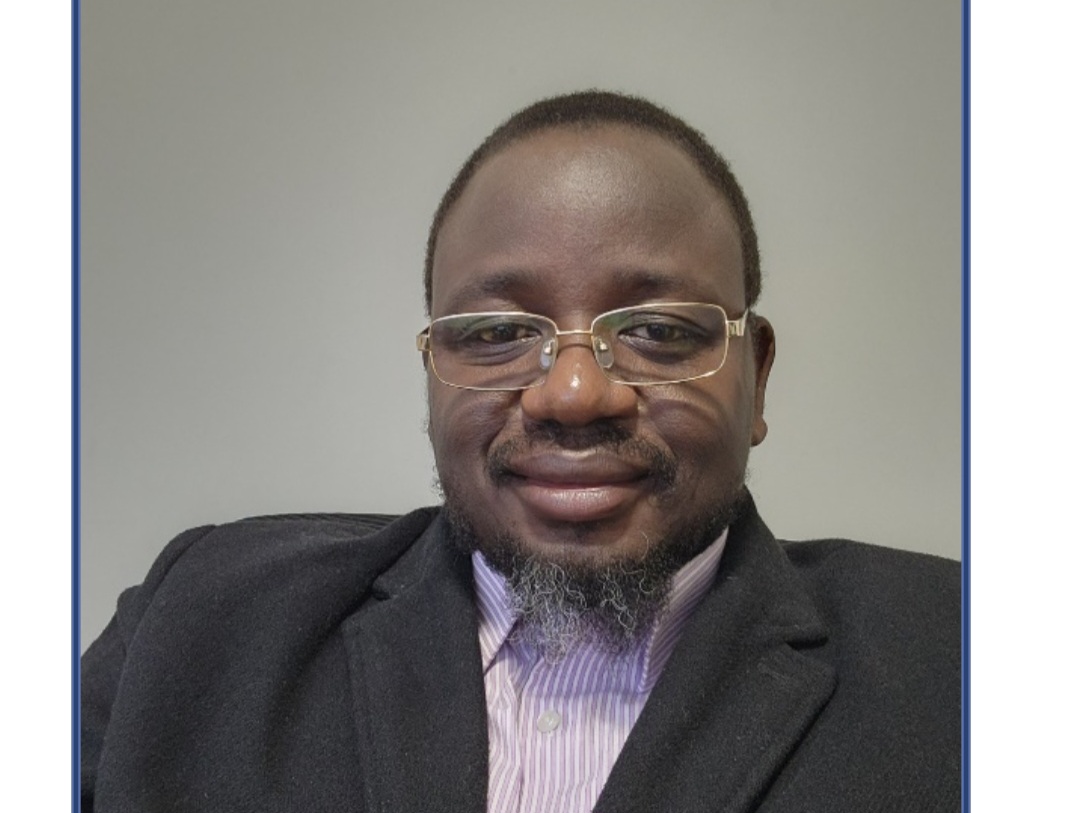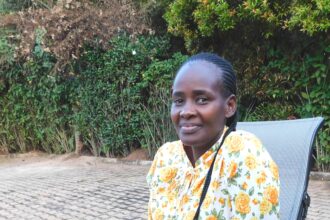In Busoga, like many regions in Uganda, late reportage, diagnosis, and treatment of cervical and breast cancer remain significant challenges for both the society and government.
The consequences of delayed medical attention are evident in the stories of three women, whose experiences highlight the importance of regular medical check-ups and early detection.
Two Women, Two Stories of Survival.
Omukaire Eseza Azalirwa, 65, from Itukulu Village, Nawanyango sub county in Kamuli district, was diagnosed with breast cancer several years ago. Despite the initial shock and heartbreak, she underwent treatment and now receives support from Rays of Hope Hospice Jinja.
“…I remember the day I was diagnosed with breast cancer, some years ago like it was yesterday. I was devastated. I thought it was the end of me. But when the doctor told me I had to lose my breasts, I was heartbroken. I thought, ‘…What will I be without my breasts?’ But you know what? I am more than my breasts. I am a grandmother, a farmer, and a survivor. Now, I’m grateful for the treatment that saved my life. I get support from Rays of Hope Hospice, and I am able to take care of my grandkids and tend to my garden. Life is precious.”
Today, she is grateful for a second chance at life and is able to care for her grandkids and tend to her garden.
Similarly, Omukaire Nalongo Florence, 62, from Lwanika village, Bukatube sub county in Mayuge district, was diagnosed with cervical cancer. After receiving treatment, she is now thriving and living life to the fullest. She credits Rays of Hope Hospice Jinja for providing her with emotional support and helping her access medical care.
“…I was so scared when I found out I had cervical cancer. I thought of all the things I would not get to do – see my grandkids grow up, attend their weddings, and enjoy my old age. But God is good. I received treatment, and now I’m thriving. Going through radiotherapy and chemotherapy was a sacrifice, but it was worth it. I’m alive, and I am living life to the fullest. Rays of Hope Hospice has been a blessing – they provide me with emotional support and help me access medical care. I am grateful for a second chance.”
A Tragic Contrast.
In stark contrast, Nekesa Florence, 53, from Bukaya East Zone,Njeru Municipality in Buikwe district, is bedridden and struggling with advanced cancer.
She is anemic, has bed sores and suffers from gastric irritation, and losing a lot of weight, among other symptoms.
“…I wish I had known about the importance of regular check-ups earlier. I was too afraid to go to the hospital, and now…now it’s too late. I am bedridden, paralyzed and my one son Samson Nkambwe and his wife are the ones struggling to take care of me. I don’t want anyone else to go through what I am going through. Please, women, don’t be like me. Go for your check-ups, and don’t ignore your body. It’s worth it…”
Nekesa’s situation is heart-wrenching. Her husband’s decision to leave her while she’s battling cancer has undoubtedly added to her emotional pain.
Despite her son Samson Nkambwe’s unwavering support, Nekesa’s situation is a heart-wrenching reminder of the consequences of late detection. However, with Samson Nkambwe’s support, she finds the strength to face her illness and other challenges.
The visibly worried Samson Nkambwe vows to stand by his mother even when the father and other siblings have abandoned her.
“…its very challenging for me and my wife because right now we do not have money, I have become less productive at my workplace where I am always absent from duties, my wife has to help her in all ways from cleaning to feeding and changing her clothes…”, the teary Samson Nkambwe narrates the painful ordeal to this reporter.
The Importance of Regular Medical Check-Ups.
According to experts, regular medical check-ups are crucial for early detection and treatment of cervical and breast cancers. Early detection can significantly improve treatment outcomes, reducing the risk of complications and death. Regular screenings can detect cancers at an early stage, when they are more treatable and survival rates are higher.
The stories of these three women serve as a microcosm of the challenges faced by many in Busoga and Uganda as a whole. It is essential for women to prioritize their health by seeking medical attention when necessary and undergoing regular screenings.
By doing so, they can reduce their risk of developing advanced cancer and improve their chances of survival.
Organizations like Rays of Hope Hospice Jinja provide palliative care, emotional support, and counseling to cancer patients and their families. Their services are essential in helping patients cope with the physical and emotional challenges of cancer.
As the scenarios illustrate, regular medical check-ups and early detection can make a significant difference in the fight against cervical and breast cancer. According to Irene Maleba, a Medical Clinical Officer attached to Rays of Hope Hospice Jinja, the organization offers palliative care with medicines for pain and other symptoms.
Besides attending to the patient, Irene Naleba who works both at the facility’s clinic and conducts field visits on regular basis, Rays of Hope Hospice Jinja also counsel the family members to minimize on the levels of stress by offering them the much-needed psychosocial support.
The Importance of Regular Medical Check-Ups for Cervical and Breast Cancers.
Cervical and breast cancers are often asymptomatic in their early stages, meaning that women may not experience noticeable symptoms until the disease has advanced to a critical point.
According to experts, regular medical check-ups are crucial for early detection and treatment of these cancers.
Early Detection: Regular screenings can detect cervical and breast cancers at an early stage, when they are more treatable and survival rates are higher.
Prevention: Regular check-ups can also help prevent cervical cancer through HPV vaccination and screening for abnormal cell changes.
Improved Treatment Outcomes: Early detection and treatment can significantly improve treatment outcomes, reducing the risk of complications and death.
Reduced Risk of Advanced Disease: Regular screenings can help identify cancers before they spread to advanced stages, reducing the risk of irreversible and untreatable disease.
The Risks of Late Detection.
Advanced Disease: By the time symptoms appear, the disease may have already progressed to an advanced stage, making treatment more challenging and reducing survival rates.
Poor Treatment Outcomes: Late detection can lead to poor treatment outcomes, including increased risk of recurrence, metastasis, and death.
The Importance of Screening.
Cervical Cancer Screening: Regular Pap tests and HPV screenings can detect abnormal cell changes and prevent cervical cancer.
Breast Cancer Screening: Regular mammograms and clinical breast exams can detect breast cancer at an early stage, improving treatment outcomes.
Irene Maleba now urges women to take control of their health and seek medical attention, when necessary, saying it is only by working together, that everyone can reduce the incidence and impact of these diseases in the communities.
Do you have a story in your community or an opinion to share with us: Email us at Submit an Article








